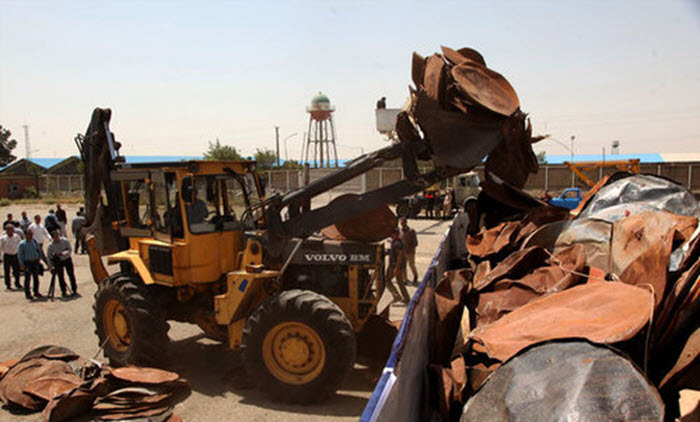
Iran Focus
London, 25 Jul – The authorities in Iran destroyed 100,000 satellite dishes and receivers as part of a crackdown against the banned devices.
State media agency, Basij News, reported that the destruction ceremony took place on Sunday, June 24, in the presence of General Mohammad Reza Naghdi, head of the Iranian regime’s Basij militia.
Naghdi warned of the terrible impact that satellite television has on society’s morals.
He said: “The truth is that most satellite channels… deviate the society’s morality and culture. What these televisions really achieve is increased divorce, addiction and insecurity in society.”
Not to mention the fact that state control of media is of extreme importance to a dictatorship; if Iranian’s can see the society outside of their country, it could encourage rebellion, protests, and strikes.
If they see the Iranian Resistance on worldwide news channels or a sitcom where women are not treated as second class citizens or a drama where the LGBT+ community are not punished by the government, it could really weaken the regime’s position.
The regime has banned satellite dishes and those who sell, use or repair any equipment face a fine of up to $2,800 (€2,500). Neighbourhoods are often raided by police with the offending dishes being confiscated.
Despite this most Iranians continue to watch satellite channels.
Culture Minister Ali Jannati said: “Reforming this law is very necessary as using satellite is strictly prohibited, but most people use it.”
Despite regular crackdowns, Jannati estimated that around 70% of Iranians violate this particular law.
Naghdi said: “Most of these satellite channels not only weaken the foundation of families but also cause disruptions in children’s education and children who are under the influence of satellite have improper behaviour.”
The regime has tried other methods to stop the spread of satellite television stations by jamming signals but there are ways around their blockade.
In July 2015, Mullah Mir Ahmadi, a senior Iranian cleric said: “Satellite television is more dangerous than an atomic bomb.”
He urged the regime to launch pro-regime satellite channels to combat those manned by the resistance movement in exile.
One of the biggest opposition satellite channels in Simaye Azadi, broadcasts news and information to Iranians worldwide, providing uncensored news and information.
In Iran, these topics are banned from media coverage:
• Human rights violations committed by the mullahs
• The suppression of ethnic minorities in Iran
• The regime’s meddling in the affairs of other countries
• Iran’s support for terrorism in the Middle East
It is estimated that 40% of Iranian families have access to it, in part because of the regime’s crackdown on internet freedom (blocking around five million websites, tracking down and arresting online activists). Their viewing habits cannot be tracked in the same way that their internet usage can.
Gholamreza Khosravi, an activist of the People’s Mojahedin Organization of Iran, PMOI (Mujahedin-e-Khalq, MEK), collected information and provided financial assistance to the Simaye Azadi station. He was executed for this in June 2014.